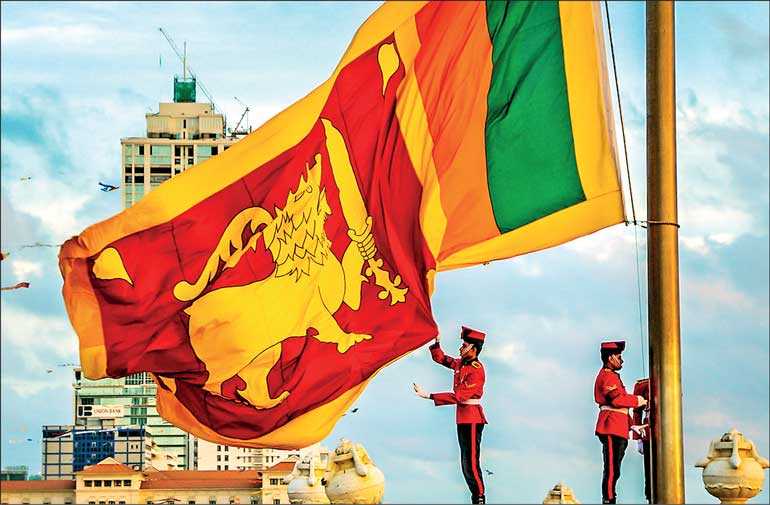Sunday Mar 01, 2026
Sunday Mar 01, 2026
Wednesday, 1 January 2020 00:45 - - {{hitsCtrl.values.hits}}

By Devaka Gunawardena
One of the most powerful tools of the nationalist right around the world is convincing people that “others” are to blame for their problems. Those othered need not even be people who exist but could be figures who represent fears.
For example, the powerful global presence of Islamophobic discourse has sharpened people’s anxieties about ethnically- and religiously-coded actors seen as terrorists. At the same time, the nationalist right intuitively understands that it must frame social problems as a struggle between the bottom and top. That’s why progressives, for example, are often smeared as “elites” who patronise minorities at the expense of the majority.
Centrist neoliberalism, on the other hand, ignores fundamental social divisions, prioritising adherence to procedure over conflict. That makes it helpless to counter the pervasive appeal of nationalist rhetoric. Instead, only a deep appreciation of the divide between rich and poor, or capitalists and workers, can shape the appropriate progressive response to nationalism.
In Sri Lanka, the current political moment makes the task of responding to nationalist rhetoric urgent, even as the political leadership that can take up this struggle has yet to consolidate.
The collapse of solidarity and the rise of nationalism
To understand fears among minority communities after the election in Sri Lanka, we must contextualise the ascendance of the nationalist right.
The ideological history of Sinhala nationalism, its ruptures and continuities, are of course an important part of understanding how best to confront it. But first and foremost, we must grasp the way in which society has changed over the past several decades, to appreciate the meaning and relevance of struggles for inclusion and co-existence today.
As labour activist Jane McAlevey has noted, neoliberalism not only assumed that “society does not exist,” to use Margaret Thatcher’s famous phrase, but that neoliberalism was itself the strategy to create this reality.
Because of decades of the redistribution of wealth upwards, economic crisis, and the exacerbation of problems in the form of austerity, neoliberalism has effectively succeeded in unmaking the working class as a political actor. The bonds of solidarity have been destroyed. It’s far easier now for workers, for example, to see each other as competitors rather than comrades.
The response among the Sri Lankan political opposition, from centrist neoliberalism to left-wing socialism, has been to try and occupy the space of nationalism. Sajith Premadasa, for example, doesn’t appear to directly confront racist claims about minorities who voted for him. He doesn’t reframe the debate by endorsing the engagement of northern and eastern peripheries in mainstream politics. Instead, he follows old platitudes of respecting religion, defending the nation, and so on.
The JVP, on this issue at least, attempted to reframe national security as public security, question budget priorities for military versus social welfare spending, and so on. But even it has fallen into the same trap as its FSP brethren in opposing “US/Chinese” conspiracies against the country, such as the MCC Agreement, rather than highlighting the pervasive long-term effects of austerity on people’s lives.
Its rhetoric against imperialism has uneasy parallels with that of the nationalist right. Rather than an analysis of the dangerous potential for authoritarian consolidation alongside xenophobic mobilisation in the current moment, rhetoric about nefarious foreign actors has become an easy fall-back option for a left lacking a mass social basis.
Internationalism from below
The takeaway from the opposition’s ambiguity and the SLPP’s decisive victory in the Presidential Election is that if you fight on the terrain of nationalism, you will lose to those who can present themselves as the “real deal” in terms of defending national security in its most concrete, toxic form.
A fundamental question, however, remains: how do we recreate the bonds of solidarity when they have dissolved in market competition, and the only alternative appears to be an imagined national community in which dissent is eliminated?
Simply put, only a strong defence of universal social services, especially free education and healthcare, for all who are reside in the country, is the solution. There are many reasons, but a few include the fact that if people feel disconnected from the process of governing, decommodifying services would ease their mental and physical burdens. It would enable them to participate in the decision-making process, along with increasing their collective bargaining power.
Moreover, fighting for the redistribution of wealth goes to the root of Antonio Gramsci’s theory that the “national-popular” is not necessarily an expression of reality but an aspiration. A nation divided between rich and poor is no community at all, but a mask of oppression. At the same time, overcoming inequality requires organising as an entirely different kind of collective actor: the working class. Nationalism then is unworkable both as the goal and the method of achieving that goal.
Rather than nationalism then, the only true solidarity that can defeat capitalism and the reactionary political forces it engenders is a working class movement to defend and expand access to universal services.
The political level at which this struggle occurs is the state, given the leverage it can exercise over capital through its laws and institutions. But the community thus imagined would necessarily extend deeper and further than the boundaries of the Sri Lankan nation, encompassing ever more and diverse groups of people.
To the extent possible, progressives, led in the battle of the ideas by the left, must repeat the formula, until it becomes clear as the difference between night and day, that nationalism’s solution to social problems is unworkable and only a strong working class movement can find solutions to the problems that are most relevant to people’s everyday lives.
That means responding with appropriate anger to the loss and devastation caused by capitalism in working class communities, and their shared experiences with others from around the world. In sum, internationalism from below.